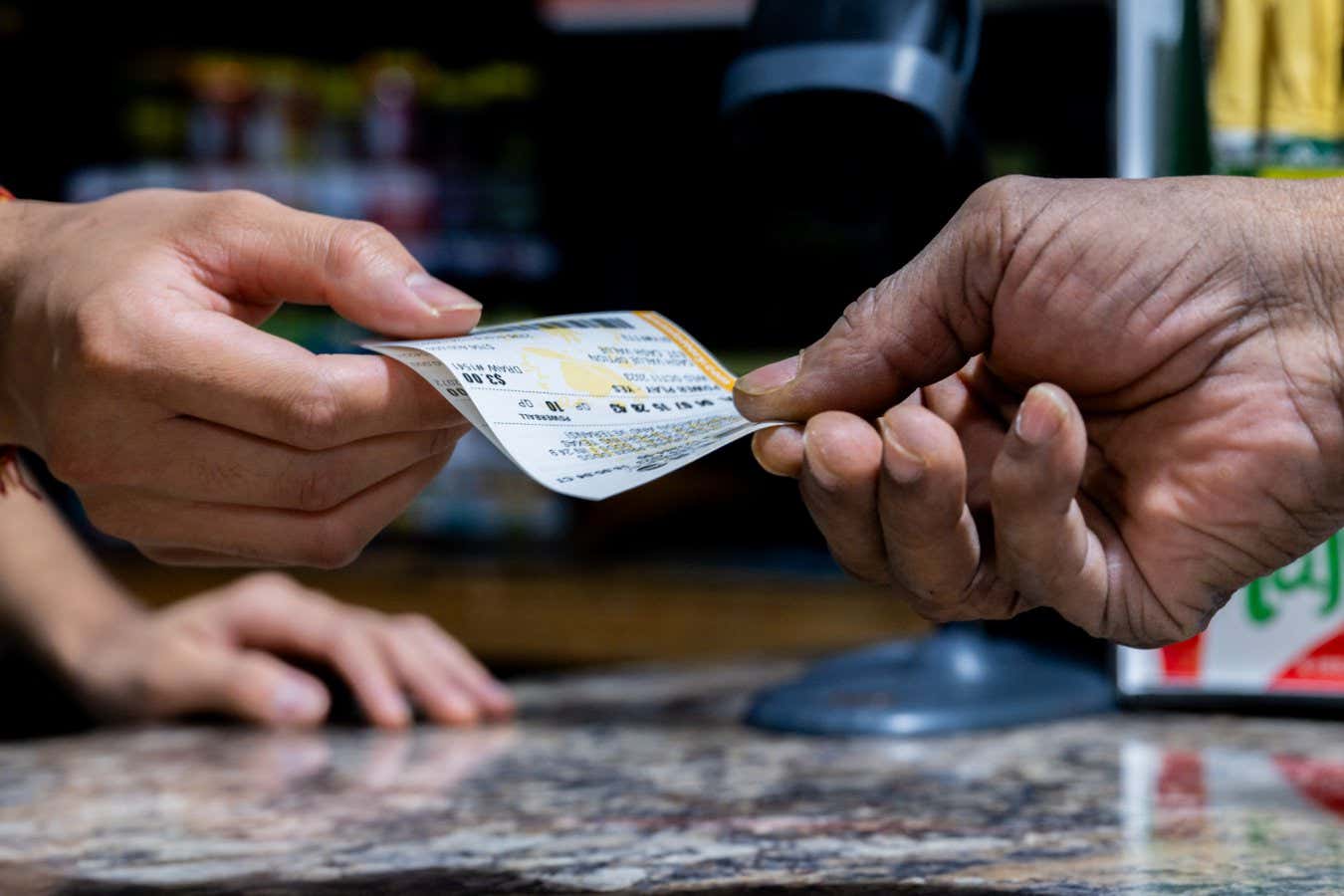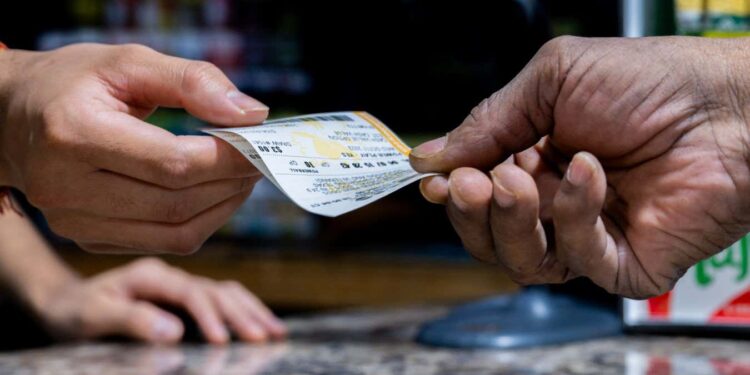
How can maths help you win the lottery?
Brandon Bell/Getty Images
I have a completely foolproof, 100-per-cent-guaranteed method for winning any lottery you like. If you follow my very simple method, you will absolutely win the maximum jackpot possible. There is just one teeny, tiny catch – you’re going to need to already be a multimillionaire, or at least have a lot of rich friends.
Let’s take the US Powerball lottery as an example. To play, you pick five different “white” numbers from 1 to 69, and a sixth “red” number from 1 to 26 – this last number can be a repeat of one of the white ones. How many different possible lottery tickets are there? To calculate that, we need to turn to a field of mathematics called combinatorics, which, as the name suggests, is a way of calculating the number of possible combinations of objects.
Picking numbers from an unordered set, as with a lottery, is an example of an “n choose k” problem, where n is the total number of objects we can choose from (69 in the case of the white Powerball numbers) and k is the number of objects we want to pick from that set. Crucially, because you can’t repeat the white numbers, these choices are made “without replacement” – as each winning numbered ball is selected for the lottery, it doesn’t go back into the pool of available choices.
Mathematicians have a handy formula for calculating the number of possible results of an n choose k problem: n! / (k! × (n – k)!). If you’ve not encountered it before, a mathematical “!” doesn’t mean we’re very excited – it’s a symbol that stands for the factorial of a number, which is simply the number you get when you multiply a whole number, or integer, by all of those smaller than itself. For example, 3! = 3 × 2 × 1 = 6.
Plugging in 69 for n and 5 for k, we get a total of 11,238,513. That’s quite a lot of possible lottery tickets, but as we will see later on, perhaps not enough. This is where the red Powerball comes in – it essentially means you are playing two lotteries at once and must win both for the largest prize. This makes it a lot harder to win. If you just simply added a sixth white ball, you’d have a total of 119,877,472 possibilities. But because there are 26 possibilities for red balls, we multiply the combinations of the white balls by 26 to get a total of 292,201,338 – much higher.
Ok, so we have just over 292 million possible Powerball tickets. Now, here comes the trick to always winning – you simply buy every possible ticket. Simple maybe isn’t quite the right word here, given the logistics involved, and most importantly, with tickets costing $2 apiece, you will need to have over half a billion dollars on hand.
Is it enough to absolutely guarantee a big payout? That’s a slightly tricky question to answer. The Powerball jackpot rolls over each week it remains unclaimed, meaning the amount you can win varies. But there have been only 15 examples of the jackpot getting higher than the $584 million you need to buy every ticket, so most of the time it’s not worth it. The profit in doing so is further diminished by the fact that jackpots can be shared by multiple winners who choose the same numbers, and that around 30 per cent of the winnings are taken in tax.
In a way, none of this should be surprising – if there was a guaranteed way to win lotteries and make a profit, people would be doing it all the time and lottery runners would go bust. But surprisingly, badly designed lotteries do crop up – and savvy investors sweep in to make a killing.
One of the first examples of this kind of lottery busting involved the writer and philosopher Voltaire. Together with Charles Marie de La Condamine, a mathematician, he formed a syndicate to buy all the tickets in a lottery linked to French government debt. Exactly how he went about this is murky and there is some suggestion of skullduggery, such as not having to pay full price for the tickets, but the upshot is that the syndicate appears to have won repeatedly before the authorities shut the lottery down in 1730. Writing about it later, in the third person, Voltaire said “winning lots were paid in cash and all in such a way that any group of people who had bought all the tickets stood to win a million francs. Voltaire entered into association with numerous company and struck lucky.”
More modern lotteries have also suffered the same fate. A famous example is the Irish National Lottery, which was bought out by a syndicate of a couple dozen people in 1992. At the time, players had to pick six numbers from 1 to 36, which our n choose k formula tells us produces 1,947,792 possible tickets. With tickets costing 50 Irish pence (the currency at the time), the conspirators raised the necessary £973,896 and began buying tickets for an estimated £1.7 million prize draw.
Lottery organisers got wind of the scheme and began limiting the number of tickets each vendor could sell, meaning the syndicate only managed to purchase about 80 per cent of ticket combinations. In the end, it shared the jackpot with two other winners, giving it a loss-making prize of £568,682. Luckily for the syndicate, the lottery had also introduced a guaranteed £100 prize for matching four numbers, which brought its total to £1,166,000.
The Irish National Lottery quickly changed the rules to avoid a similar scheme, and these days requires six numbers chosen from 47, upping the number of tickets to 10,737,573. The jackpot is capped at €18.9 million, while tickets are €2 each, ensuring that buying the lottery will never be profitable.
Despite the fact that the risks of a poorly designed lottery should now be well understood, these incidents may still be occurring. One extraordinary potential example came in 2023, when a syndicate won a $95 million jackpot in the Texas State Lottery. The Texas lottery is 54 choose 6, a total of 25,827,165 combinations, and tickets cost $1 each, making this a worthwhile enterprise – but the syndicate may have had assistance from the lottery organisers themselves. While the fallout from the scandal is still unfolding, and it is not known whether anything illegal has occurred, the European-based syndicate, working through local retailers, may have acquired ticket-printing terminals from the organisers of the Texas lottery, allowing it to purchase the necessary tickets and smooth over the logistics. The lottery commissioner at the time has denied being part of any illegal scheme. And no criminal charges have been filed – the lawyer that represents the syndicate that claimed the jackpot, known as Rook TX, said “All applicable laws, rules and regulations were followed.”
So there you have it. Provided that you have a large sum of upfront cash, and can find a lottery where the organisers have failed to do their due diligence with the n choose k formula, you can make a tidy profit. Good luck!
Topics:
Source link : https://www.newscientist.com/article/2486621-the-foolproof-way-to-win-any-lottery-according-to-maths/?utm_campaign=RSS%7CNSNS&utm_source=NSNS&utm_medium=RSS&utm_content=home
Author :
Publish date : 2025-07-03 09:00:00
Copyright for syndicated content belongs to the linked Source.














